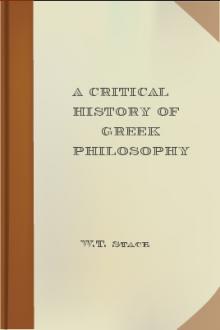A Critical History of Greek Philosophy by W. T. Stace (the false prince series .txt) 📕

- Author: W. T. Stace
- Performer: -
Book online «A Critical History of Greek Philosophy by W. T. Stace (the false prince series .txt) 📕». Author W. T. Stace
Anaximander also developed a striking theory about the origin and evolution of living beings. In the beginning the earth was fluid and in the gradual drying up by evaporation of this fluid, living beings were produced from the heat and moisture. In the first instance these beings were of a low order. They gradually evolved into successively higher and higher organisms by means of adaptation to their environment. Man was in the first instance a fish living in the water. The gradual drying up left parts of the earth high and dry, and marine animals migrated to the land, and their fins by adaptation became members fitted for movement on land. The resemblance of this primitive theory to modern theories of evolution is remarkable. It is easy to exaggerate its importance, but it is at any rate clear that Anaximander had, by a happy guess, hit upon the central idea of adaptation of species to their environment.
The teaching of Anaximander exhibits a marked advance beyond the position of Thales. Thales had taught that the first principle of things is water. The formless matter of Anaximander is, philosophically, an advance on this, showing the operation of thought and abstraction. Secondly, Anaximander had definitely attempted to apply this idea, and to derive from it the existent world. Thales had left the question how the primal water developed into a world, entirely unanswered.
Anaximenes
Like the two previous thinkers Anaximenes was an inhabitant of Miletus. He was born about 588 B.C. and {28} died about 524. He wrote a treatise of which a small fragment still remains. He agreed with Thales and Anaximander that the first principle of the universe is material. With Thales too, he looked upon it as a particular kind of matter, not indeterminate matter as taught by Anaximander. Thales had declared it to be water. Anaximenes named air as first principle. This air, like the matter of Anaximander, stretches illimitably through space. Air is constantly in motion and has the power of motion inherent in it and this motion brought about the development of the universe from air. As operating process of this development Anaximenes named the two opposite processes of (1) Rarefaction, (2) Condensation. Rarefaction is the same thing as heat or growing hot, and condensation is identified with growing cold. The air by rarefaction becomes fire, and fire borne aloft upon the air becomes the stars. By the opposite process of condensation, air first becomes clouds and, by further degrees of condensation, becomes successively water, earth, and rocks. The world resolves again in the course of time into the primal air. Anaximenes, like Anaximander, held the theory of "innumerable worlds," and these worlds are, according to the traditional view, successive. But here again Professor Burnet considers that the innumerable worlds may have been co-existent as well as successive. Anaximenes considered the earth to be a flat disc floating upon air.
The origin of the air theory of Anaximenes seems to have been suggested to him by the fact that air in the form of breath is the principle of life.
The teaching of Anaximenes seems at first sight to be {29} a falling off from the position of Anaximander, because he goes back to the position of Thales in favour of a determinate matter as first principle. But in one respect at least there is here an advance upon Anaximander. The latter had been vague as to how formless matter differentiates itself into the world of objects. Anaximenes names the definite processes of rarefaction and condensation. If you believe, as these early physicists did, that every different kind of matter is ultimately one kind of matter, the problem of the differentiation of the qualities of the existent elements arises. For example, if this paper is really composed of air, how do we account for its colour, its hardness, texture, etc. Either these qualities must be originally in the primal air, or not. If the qualities existed in it then it was not really one homogeneous matter like air, but must have been simply a mixture of different kinds of matter. If not, how do these properties arise? How can this air which has not in it the qualities of things we see, develop them? The simplest way of getting out of the difficulty is to found quality upon quantity, and to explain the former by the amount or quantity, more or less, of matter existent in the same volume. This is precisely what is meant by rarefaction and condensation. Condensation would result in compressing more matter into the same volume. Rarefaction would give rise to the opposite process. Great compression of air, a great amount of it in a small space, might account for the qualities, say, of earth and stones, for example, their heaviness, hardness, colour, etc.
Hence Anaximenes was to some extent a more logical and definite thinker than Anaximander, but cannot {30} compare with him in audacity and originality of thought.
Other Ionic Thinkers
We have now considered the three chief thinkers of the Ionic School. Others there were, but they added nothing new to the teaching of these three. They followed either Thales or Anaximenes in stating the first principle of the world either as water or as air. Hippo, for example, followed Thales, and for him the world is composed of water, Idaeus agreed with Anaximenes that it is derived from air. Diogenes of Apollonia is chiefly remarkable for the fact that he lived at a very much later date. He was a contemporary of Anaxagoras, and opposed to the more developed teachings of that philosopher the crude materialism of the Ionic School. Air was by him considered to be the ground of all things.
{31}
CHAPTER III
THE PYTHAGOREANS
Not much is known of the life of Pythagoras. Three so-called biographies have come down to us from antiquity, but they were written hundreds of years after the event, and are filled with a tissue of extravagant fancies, and with stories of miracles and wonders worked by Pythagoras. All sorts of fantastic legends seem to have gathered very early around his life, obscuring from us the actual historical details. A few definite facts, however, are known. He was born somewhere between 580 and 570 B.C. at Samos, and about middle age he migrated to Crotona in South Italy. According to legend, before he arrived in South Italy he had travelled extensively in Egypt and other countries of the East. There is, however, no historical evidence of this. There is nothing in itself improbable in the belief that Pythagoras made these travels, but it cannot be accepted as proved for lack of evidence. The legend is really founded simply upon the oriental flavour of his doctrines. In middle age he arrived in South Italy and settled at Crotona. There he founded the Pythagorean Society and lived for many years at the head of it. His later life, the date and manner of his death, are not certainly known.
Now it is important to note that the Pythagorean {32} Society was not primarily a school of philosophy at all. It was really a religious and moral Order, a Society of religious reformers. The Pythagoreans were closely associated with the Orphic Sect, and took from it the belief in the transmigration of souls, including transmigration of human souls into animals. They also taught the doctrine of the "wheel of things," and the necessity of obtaining "release" from it, by which one could escape from the weary round of reincarnate lives. Thus they shared with the Orphic religious Sect the principle of reincarnation. The Orphic Sect believed that "release" from the wheel of life was to be obtained by religious ceremonial and ritual. The Pythagoreans had a similar ritual, but they added to this the belief that intellectual pursuits, the cultivation of science and philosophy, and, in general, the intellectual contemplation of the ultimate things of the universe would be of great help towards the "release" of the soul. From this arose the tendency to develop science and philosophy. Gradually their philosophy attained a semi-independence from their religious rites which justifies us in regarding it definitely as philosophy.
The Pythagorean ethical views were rigorous and ascetic in character. They insisted upon the utmost purity of life in the members of the Order. Abstinence from flesh was insisted upon, although this was apparently a late development. We know that Pythagoras himself was not a total abstainer from flesh. They forbade the eating of beans. They wore a garb peculiar to themselves. The body, they taught, is the prison or tomb of the soul. They thought that one must not attempt to obtain "release" by suicide, because "man is the {33} property of God," the chattel of God. They were not politicians in the modern sense, but their procedure in practice amounted to the greatest possible interference in politics. It appears that the Pythagoreans attempted to impose their ordinances upon the ordinary citizens of Crotona. They aimed at the supersession of the State by their own Order and they did actually capture the government of Crotona for a short period. This led to attacks on the Order, and the persecution of its members. When the plain citizen of Crotona was told not to eat beans, and that under no circumstances could he eat his own dog, this was too much. A general persecution occurred. The meeting place of the Pythagoreans was burnt to the ground, the Society was scattered, and its members killed or driven away. This occurred between the years 440 and 430 B.C. Some years later the Society revived and continued its activities, but we do not hear much of it after the fourth century B.C.
It was largely a mystical society. The Pythagoreans developed their own ritual, ceremonial and mysteries. This love of mystery, and their general character as miracle-mongers, largely account for the legends which grew up around the life of Pythagoras himself. Their scientific activities were also considerable. They enforced moral self-control. They cultivated the arts and crafts, gymnastics, music, medicine, and mathematics. The development of mathematics in early Greece was largely the work of the Pythagoreans. Pythagoras is said to have discovered the 47th Proposition of Euclid, and to have sacrificed an ox in honour thereof. And there is good reason to believe that practically the whole of the substance of the First Book of Euclid is the work of Pythagoras.
{34}
Turning now to their philosophical teaching, the first thing that we have to understand is that we cannot speak of the philosophy of Pythagoras, but only of the philosophy of the Pythagoreans. For it is not known what share Pythagoras had in this philosophy or what share was contributed by his successors. Now we recognize objects in the universe by means of their qualities. But the majority of these qualities are not universal in their scope; some things possess some qualities; others possess others. A leaf, for example, is green, but not all things are green. Some things have no colour at all. The same is true of tastes and smells. Some things are sweet; some bitter. But there is one quality in things which is absolutely universal in its scope, which applies to everything in the universe--corporeal or incorporeal. All things are numerable, and can be counted. Moreover, it is impossible to conceive a universe in which number is not to be found. You could easily imagine a universe in which there is no colour, or no sweet taste, or a universe in which nothing possesses weight. But you cannot imagine a universe in which there is no number. This is an inconceivable thought. Upon these grounds we should be justified in concluding that number is an extremely important aspect of things, and forms a fundamental pad of the framework of the world. And it is upon this aspect of things that the Pythagoreans laid emphasis.
They drew attention to proportion, order, and harmony as





Comments (0)